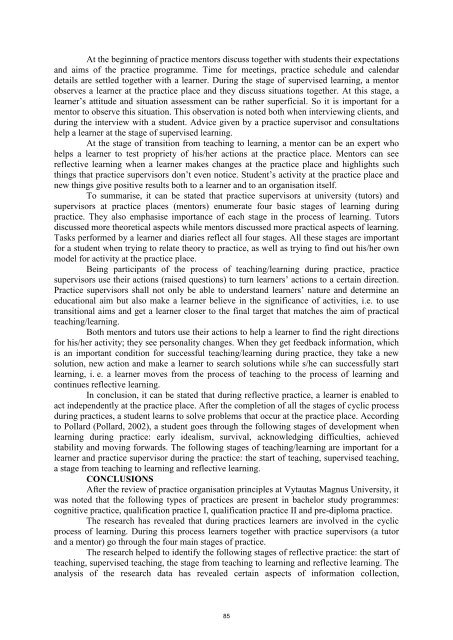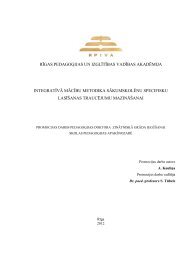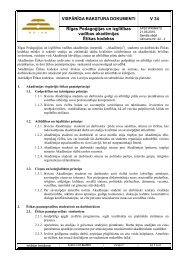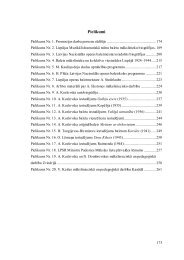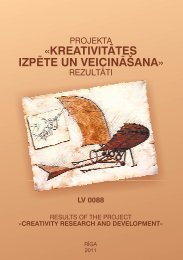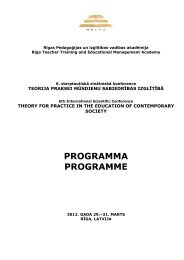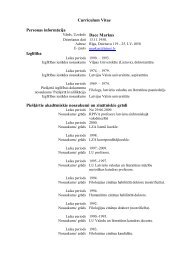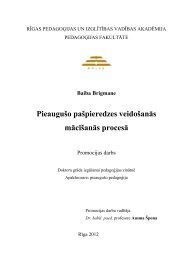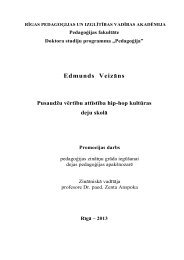saturs - rpiva
saturs - rpiva
saturs - rpiva
- No tags were found...
Create successful ePaper yourself
Turn your PDF publications into a flip-book with our unique Google optimized e-Paper software.
At the beginning of practice mentors discuss together with students their expectations<br />
and aims of the practice programme. Time for meetings, practice schedule and calendar<br />
details are settled together with a learner. During the stage of supervised learning, a mentor<br />
observes a learner at the practice place and they discuss situations together. At this stage, a<br />
learner’s attitude and situation assessment can be rather superficial. So it is important for a<br />
mentor to observe this situation. This observation is noted both when interviewing clients, and<br />
during the interview with a student. Advice given by a practice supervisor and consultations<br />
help a learner at the stage of supervised learning.<br />
At the stage of transition from teaching to learning, a mentor can be an expert who<br />
helps a learner to test propriety of his/her actions at the practice place. Mentors can see<br />
reflective learning when a learner makes changes at the practice place and highlights such<br />
things that practice supervisors don’t even notice. Student’s activity at the practice place and<br />
new things give positive results both to a learner and to an organisation itself.<br />
To summarise, it can be stated that practice supervisors at university (tutors) and<br />
supervisors at practice places (mentors) enumerate four basic stages of learning during<br />
practice. They also emphasise importance of each stage in the process of learning. Tutors<br />
discussed more theoretical aspects while mentors discussed more practical aspects of learning.<br />
Tasks performed by a learner and diaries reflect all four stages. All these stages are important<br />
for a student when trying to relate theory to practice, as well as trying to find out his/her own<br />
model for activity at the practice place.<br />
Being participants of the process of teaching/learning during practice, practice<br />
supervisors use their actions (raised questions) to turn learners’ actions to a certain direction.<br />
Practice supervisors shall not only be able to understand learners’ nature and determine an<br />
educational aim but also make a learner believe in the significance of activities, i.e. to use<br />
transitional aims and get a learner closer to the final target that matches the aim of practical<br />
teaching/learning.<br />
Both mentors and tutors use their actions to help a learner to find the right directions<br />
for his/her activity; they see personality changes. When they get feedback information, which<br />
is an important condition for successful teaching/learning during practice, they take a new<br />
solution, new action and make a learner to search solutions while s/he can successfully start<br />
learning, i. e. a learner moves from the process of teaching to the process of learning and<br />
continues reflective learning.<br />
In conclusion, it can be stated that during reflective practice, a learner is enabled to<br />
act independently at the practice place. After the completion of all the stages of cyclic process<br />
during practices, a student learns to solve problems that occur at the practice place. According<br />
to Pollard (Pollard, 2002), a student goes through the following stages of development when<br />
learning during practice: early idealism, survival, acknowledging difficulties, achieved<br />
stability and moving forwards. The following stages of teaching/learning are important for a<br />
learner and practice supervisor during the practice: the start of teaching, supervised teaching,<br />
a stage from teaching to learning and reflective learning.<br />
CONCLUSIONS<br />
After the review of practice organisation principles at Vytautas Magnus University, it<br />
was noted that the following types of practices are present in bachelor study programmes:<br />
cognitive practice, qualification practice I, qualification practice II and pre-diploma practice.<br />
The research has revealed that during practices learners are involved in the cyclic<br />
process of learning. During this process learners together with practice supervisors (a tutor<br />
and a mentor) go through the four main stages of practice.<br />
The research helped to identify the following stages of reflective practice: the start of<br />
teaching, supervised teaching, the stage from teaching to learning and reflective learning. The<br />
analysis of the research data has revealed certain aspects of information collection,<br />
85


